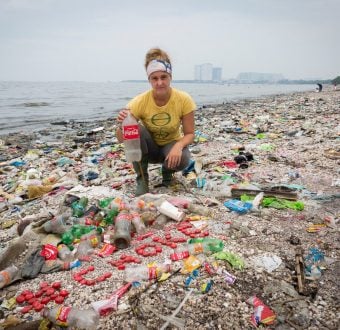Nearly 20 years after the world’s worst industrial disaster, survivors and activists from the 1984 Bhopal tragedy warn that terrorists could easily turn chemical plants and freight trains into weapons of mass destruction in the United States. They are calling on both Dow Chemical Company and the U.S. Government to prevent such a catastrophe. The Dow/Union Carbide gas leak on December 3, 1984 killed more than 20,000 people in Bhopal India.
“Twenty years after the Bhopal tragedy, the survivors and people of Bhopal are amazed and appalled we are still dealing with the same problem the world over,” commented Bhopal survivors Rashida Bee and Champa Devi Shukla. America must recognize that thousands of Bhopals are waiting to happen within its borders, and should take steps to ensure that a similar disaster does not happen here.”
Goldman Environmental Prize Winners Rashida Bee and Champa Devi Shukla, both victims of the Bhopal tragedy, as well as Satinath Sarangi, who has provided care for 12,800 victims, were joined by elected officials, including Senator Corzine (NJ), Representative Pallone (NJ) and D.C. Councilmember Kathy Patterson, as well as environmental and public interest advocates at the event.
Dragging our Feet
“The vulnerability of chemical facilities to a potential terrorist attack is well-documented. Yet as we near three years after the attacks on the World Trade Center and the Pentagon, we have yet to take the first step in setting national security standards for our chemical infrastructure,” said Senator Jon Corzine (NJ).”These facilities should be required to assess their vulnerabilities, and improve their security. Security means hiring more guards and building higher fences but also making chemical facilities less attractive targets and less dangerous if an attack were to succeed by encouraging industry to use safer technologies where practicable.”
Across the United States, thousands of industrial facilities use and store hazardous chemicals in quantities that could threaten communities in accidental releases or if deliberately attacked by terrorists. According to the U.S. Environmental Protection Agency, more than 100 facilities have at least one million people living close enough to be at risk of injury or death in the event of a chemical release. On February 12, 2003, the Department of Homeland Security warned that terrorists “. . . may attempt to launch conventional attacks against the U.S. nuclear/chemical-industrial infrastructure to cause contamination, disruption and terror.”
“It is unacceptable that Dow Chemical and other companies’ facilities continue to threaten so many lives across the country,” said U.S. Public Interest Research Group Legislative Director Anna Aurilio. “We should act now by requiring chemical facilities to use safer chemicals and processes wherever possible to prevent a tragedy like Bhopal here in the U.S.”
Dow Chemical Company, which acquired Union Carbide’s Bhopal site in 2001, has taken no responsibility for cleanup of the remaining toxic contaminants, puts nearly eight million people living near its U.S. plants at risk for injury or death in the event of an accident or terrorist attack, according to an analysis by U.S. PIRG. Dow Chemical reported 2,562 accidents at their facilities between 1990 and 2003.
Safer Alternatives do Exist
The Chemical Security Act, introduced by Senator Corzine (NJ) and Representative Pallone (NJ) would require companies to assess their hazards, increase security and make their plants safer by using safer chemicals and processes where available. Within eight weeks following the September 11th attacks, Washington D.C. converted its use of chlorine at the main sewage treatment plant (Blue Plains) to safer chemicals.
Unfortunately, few other chemical plants have implemented reforms voluntarily. A recent report by U.S. PIRG showed chemical facilities owned by companies enrolled in an industry-sponsored voluntary safety program have had more than 1,800 accidents per year since 1990 and criticizes Bush administration plans to address safety and security at chemical facilities by industry self-regulation.
The Chlorine Express
Freight trains carrying deadly chlorine and other toxic chemicals continue to pass within four blocks of the U.S. Capitol every day. The U.S. Naval Research Lab testified before the D.C. Council that a terrorist-caused release of a toxic chlorine gas cloud from just one tank car over a crowded National Mall could kill or injure 100,000 people in one half hour. The Department of Homeland Security is due to issue a policy options paper to address this threat by May 7th. D.C. Councilmembers David Catania (R), Kathy Patterson (D) and Carol Schwartz (R) introduced legislation to require the re-routing of these substances around the D.C. area.
“The District shouldn’t wait for Congress and the Bush administration to protect us,” said D.C. Councilmember Kathy Patterson “While we should reduce the need for transporting dangerous chemicals nationwide by requiring safer alternative chemicals and processes, D.C.’s rerouting bill will eliminate the risk from trains passing through our neighborhoods past the U.S. Capitol building today.”

